Ahoy, squirts! Quint here with a rather nice chat with one of my favorite working filmmakers and the star of his latest flick. I was fortunate enough to get the chance to sit down with Gore Verbinski and Dane DeHaan to talk about A Cure For Wellness, their disturbing high production value crazy genre movie hitting screens this weekend.
I saw the film at Butt-Numb-A-Thon when the two decided to show it to us movie nerds a bit early and that's where we begin our conversation. As usual I kept in a little of the pre-chatter that most people cut out. In this case we talk a tad about BNAT and their poor choice of BBQ. I'm happy to tell you that Gore did ask for good Austin eats for lunch and demanded tacos, so you know he's got his priorities right. (I suggested Torchy's Tacos, by the way, and I hear that went over well). If you don't care for that kind of chit-chat, it only lasts for a bit. Be patient!
Anyway, we talk quite a bit about the challenges of tone, working on location and even a little bit about how some of the imagery reminded me of Bioshock, which was an adaptation Verbinski was going to do many moons ago, but it sadly didn't happen.
This is a good chat, folks. Give it a read and you'll see.
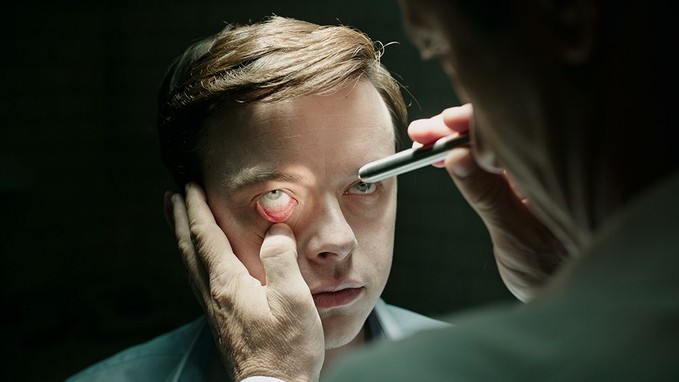
Quint: Thank you guys so much for bringing the movie to Butt-Numb-A-Thon back in December.
Gore Verbinski: That was really fun.
Dane DeHaan: Yeah, thanks for having us. What a great event.
Quint: Did you watch it at all with the crowd or did you duck out?
Dane DeHaan: We ducked out, had some drinks.
Gore Verbinski: And some BBQ.
Quint: Oh, yeah? What'd you get?
Gore Verbinski: Green something...
Quint: Green Mesquite?
Dane DeHaan: Yeah, that was it!
Quint: You messed up! There's much better BBQ in this city.
Dane DeHaan: I know, but we had a time restraint. It was a surgical procedure because I was coming back right after the screening to introduce the Valerian footage.
Quint: I want to start talking about the tone of A Cure For Wellness. One of the reasons I love the movie so much is that it holds a consistent tone even though it starts off as one kind of movie and ends up in such a radically different place.
Gore Verbinski: There are little things at the beginning, Hannah's tune, the wax seal... there are things informing you of the turn to the gothic, Lovecraftian backend. The movie's really two worlds and we tried to keep the modern world through Dane's character through to the backend and have this sort of perfume bottle of gothic blowing across the Atlantic, summoning him to this place, at the front end. Trying to make that consistent was the mortar between these diverse bricks.
Quint: Was that a big challenge throughout or did you find you cracked that pretty early on?
Gore Verbinski: We talked about the sickness in everything as a sort of unseen force. We're talking about a camera move, we're talking about performance... well, not so much the performance because Dane's character is, I think, wonderfully oblivious to it... But in the soundtrack we did a lot of recording of wheezing voices, stretched those really slowly and used those as room tones. There's a lot of subliminal stuff going on to seat you in a sense that there is a black spot on your x-ray.
Quint: Dane, Lockhart is an interesting character because he's smarmy and entitled, but when all the paranoia starts creeping in I, as an audience member, was surprised to find myself rooting for him. Did you think about that aspect to the character when going into the movie?
Dane DeHaan: Well, yeah. He definitely isn't that likeable in the beginning of the film. In a way, I think that's why he's such a great protagonist for this story, because he does embody that sickness that the movie's about.
But, yeah. That's the fine line. You're playing this guy that's not very likeable, you're in every frame of the movie and you need the audience to go on this journey with you. I wanted to create a guy you wanted to have a beer with, but you also wouldn't mind seeing him get punched in the face. You see Lockhart go through so much in the movie, so many extreme situations, that if he was too likeable you'd feel too bad for him the whole time. There is this sick pleasure you get from watching him go through it, which is why I think the movie can entertain and terrify at the same time. You're not like “Oh, poor Lockhart!” You're like “Hehe, I don't mind seeing that happen to him.”
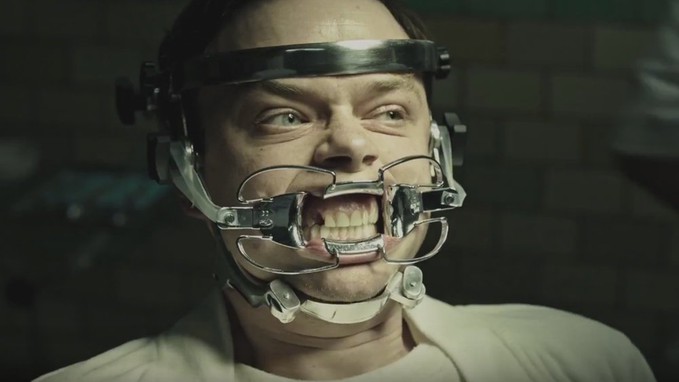
Quint: But by the end you're still wanting to see him come out on top.
Dane DeHaan: Yeah, you're still rooting for him.
Quint: There's a common thought, which I don't agree with, that every movie needs to have a likeable character. That's not true. They don't have to be likeable, but they do have to be interesting.
Gore Verbinski: Yeah, I think that likeable term just means zero moral ambiguity; it means zero complexity. Justin (Haythe) wrote Lockhart to be kind of an asshole at the beginning of this. That's why I think Dane did such a great job inhabiting the character, because you can't stop watching him. I think that's important because you could get thrown off the rails with type of writing, but as he has doubts you have more empathy for him.
Quint: It's interesting also in that Lockhart's journey isn't going from being the asshole to the nice guy. I mean, he does some good things, but his journey is more about becoming free himself.
Gore Verbinski: Sure. He's like that deer that just won't lie down. If he would just lie down it would all go so much easier!
Quint: Can we talk a little bit about the location itself? You come up with a story set in a place like this you HAVE to find the perfect location or it won't all work. How did you find it and how much did you shoot there versus on stage?
Gore Verbinski: Castle Hohenzollern, which is near Tubingen, was the exterior. I think we shot there for 11 days. It didn't really have any interior that we could use, but it had a great exterior and that wonderful circular driveway that was sort of essential (to the movie). Then there was the Beelitz, which is an old, abandoned war hospital where Hitler was treated after WW1. It was all covered in graffiti and was overgrown, but we stripped off the ivy and put a fresh coat of paint and some new windows on it. That was outside of Berlin. That's the whole interior courtyard and a lot of the hallways. If the movie's a tiramisu of layers, that's the top layer. It's nice here, steam rooms and hydrotherapy.
We needed a swimming pool, so we went to Zwickau and we found this old swimming pool that had kinda/sorta the same color tile, but not exactly. We would build some interstitial pieces, like corridors and things, but as you extend into the (place), like the aquifer and things, that was more of a build.
But when you have a place that's old and practical and sort of haunted I think it informs the performance. You just show up on set and you feel that as opposed to a painted flat. It's not just pretend.
Quint: You feel the history.
Gore Verbinski: Definitely. The history seeps in there.
Quint: Since you're both here together, can you talk a little bit about how you worked together, how you collaborated on this project?
Gore Verbinski: The biggest challenge was we were shooting so out of order. Look, it's Dane's job finding honesty in every moment, so we had many conversations about where we are and how it's going to cut so that sort of lid rattling on a pot of boiling water feeling was maintained.
Dane DeHaan: Yeah. Again, being in almost every frame of the movie there is a responsibility to keep the audience along with you. We probably had about 2 weeks where we sat down with the script and talked about everything before we shot, but every day was about reminding us “where are we in this point of the story? What happened before, what happened after?”
I think it would be easy for Lockhart to just be freaking out for 2 ½ hours because of everything that's happening to him, but that wouldn't be necessarily watchable. In one of our first meetings Gore was like “There's only two times in this movie where you can explode, where you can let it rip, where you can, for lack of a better word, act.”
That was helpful as a guideline. The script was a guideline. Gore is so visually specific, he has such a cinematic mind, that the shots become a real guideline, too. In a lot of ways I was just trying to bring his vision to life because he had such a specific vision and I was given these guidelines and what I had to do was find the truth in those specific moments.
Quint: Lockhart is a very defiant character. It's an interesting storytelling device built into the character that he feels like he's in such control that you really feel it when that starts to crumble for him.
Gore Verbinski: I think he senses the con of the place. I mean, he misinterprets it, but he thinks he has an idea. Old, wealthy people come here and they're sort of susceptible to this absolution: you're not responsible because you're not well. It's kind of a note from doctor. I always imagined it as the kind of place where you might bump into Dick Chaney in the corner of the steam room. There are costs to what these people have achieved in their lives.
Lockhart's just so much younger than the rest of them and different. He takes a stronger dose to put him down. The movie's very much a fairy tale in the sense that he's being put to sleep and Hannah is awakening, by his contagion, by his arrival in this place.
Quint: It might be the nerd in me and I might be seeing things that aren't there, but I got a sense that maybe you were scratching a little bit of the Bioshock itch with some of the imagery you used in this film.
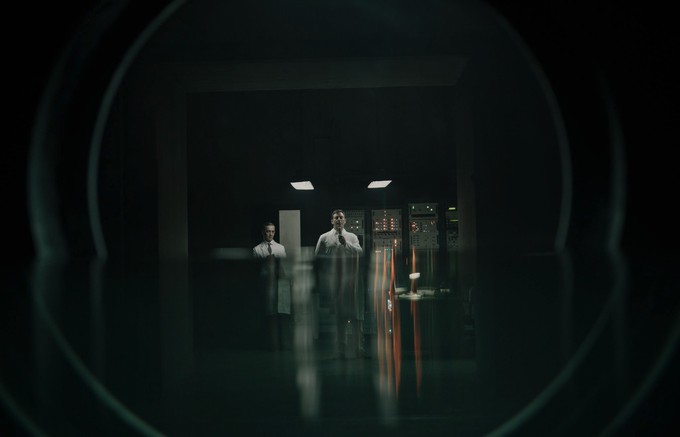
Gore Verbinski: You're not the first person to ask me that. I think that probably has to do with the isolation tanks. I wanted to make those feel like this was a lot of pressure bearing down on him. I needed a space where we could work with the eels and physically suffocate him.
But I see it as so much different. There's the concept of a wellness center that doesn't make you well. This is fundamentally a different concept at its core.
Quint: Speaking of that isolation tank scene, I liked how you had a lot of things going on. Visually you have the big practical tank, then the eels come into play and Lockhart's having visions...
Gore Verbinski: And then there's the guy, you know, spanking it to a nurse! It's an orgasm, the whole thing. It was very shot specific. It took two weeks to shoot it. We knew we were going to be in that place for a long time.
The set was divided into pieces. When Dane's drowning we can't literally fill up that thing full of water and have no escape, so there were multiple set pieces for different shots and it gets complex. He was a trooper. He was in there for a long time.
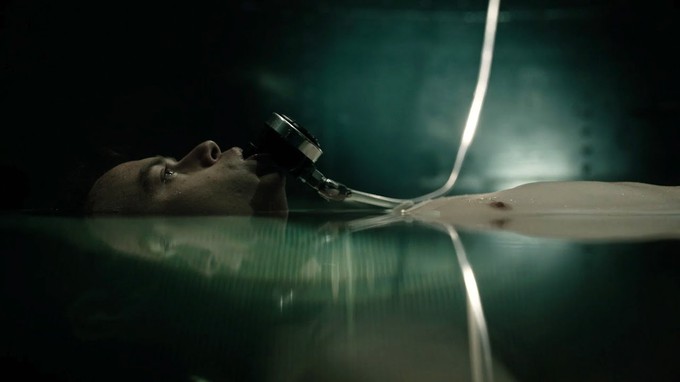
Dane DeHaan: Yeah, it was the most physically demanding sequence for me. I was wearing a harness that was attached to these metal cables that were bolted to the side of the tank to keep my body horizontal. I was underwater and breathing through an oxygen tube with nothing covering my eyes or my nose. Two weeks of that, communicating with hand signals...
Gore Verbinski: To Germans!
Dane DeHaan: (laughs) Twenty minute long takes, sometimes...
Quint: So you were prune-y.
Dane DeHaan: I was so prune-y! I was never dry. I'm not saying I was in that tank for two weeks straight, but I never had time to dry off
Quint: Which is very appropriate for the movie.
Dane DeHaan: Totally. It created a great environment for the movie.
Quint: I'd say it all came together quite well. I mean, you got the Butt-Numb-A-Thon audience squirming, which is no easy feat.
Gore Verbinski: Well, that's our audience. Honestly.
Dane DeHaan: It really is. It's a movie for Butt-Numb-A-Thoners. It's a movie for the ultimate cinephile; people that want a wild, original, strange experience. We were so happy to bring it to you guys.
Gore Verbinski: Everybody else should just stay home! (laughs) I don't really mean stay at home. The rest of you should come. We could use your support! (laughs)
Quint: Seriously though, that's what I love about your work. I love that you're not afraid to do something on a grand scale that's going to challenge the audience. I think that's why they responded to Pirates. I'm a fan of The Lone Ranger. I loved the absolutely bonkers idea to model Tonto after Buster Keaton. You don't seem to be satisfied to just make a movie you know everybody is going to like. I mean, you don't see movies like Cure for Wellness coming out of the studio system these days.
Gore Verbinski: You have to approach every movie like it's your last. I think that boundary of “I'm not sure” is a great place to be, pushing right up against that seam of the unknown. A Pirate movie is not supposed to work. That's great, let's do it! “Have you ever made an animated movie?” “No, don't know how. Let's do it!” The gig is gonna be up someday, so why not just go for it?
Quint: I see why that attitude is attractive to a director. Dane, is that equally attractive as an actor, knowing that there's not going to be another project quite like this one.
Gore Verbinski:
Dane DeHaan: Yeah, that's it. I feel like I've always tried to do different things and the more original a project is the more exciting it is to me. So many studio movies now are just a sequel to this or “this property made into that.” That can be fun, but that doesn't create the conversation that I think Cure is going to create and that doesn't have the lasting effect that I think Cure is going to have. I think it's so awesome to be a part of a movie that's this original and that really challenges an audience to accept it as the weird, messed up, crazy, wild movie that it is.
That's so much more exciting than making the movie that's going to be perfect for mass consumption and everyone is going to have the same opinion on it. Let's challenge people, let's make original content and hopefully people will support that and we can make more movies like that in the future.
Gore Verbinski: I mean, I like an Egg McMuffin, but I don't want to make one.
Quint: (laughs) That's the perfect quote to end on. Thank you so much for your time.
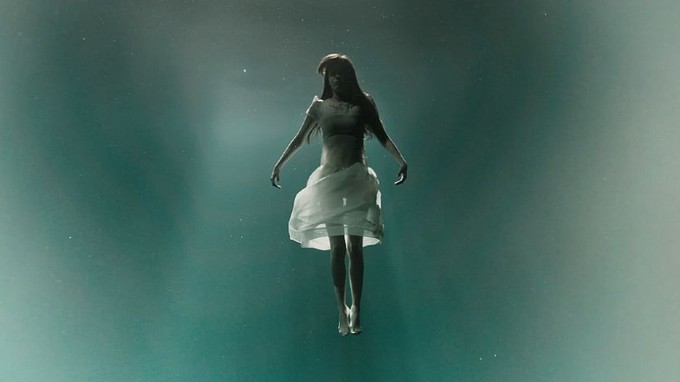
And that is absolutely the perfect way to wrap that interview up. I hope you guys enjoyed it. I'm a big fan of Mr. Verbinski's and had a blast talking to him and Dane about this nutty little movie they've cooked up.
Like I said in the interview, the studio system doesn't make this kind of movie anymore, especially on this level. If you want more bigger budget chance-taking genre fare then you owe it to yourself to seek this one out this weekend. Support 'em when we get 'em or we won't get 'em anymore!
-Eric Vespe
”Quint”
quint@aintitcool.com
Follow Me On Twitter

